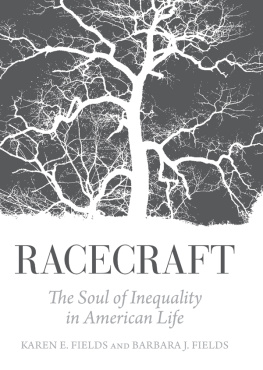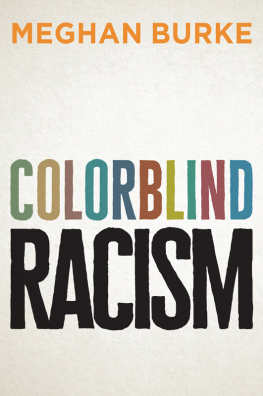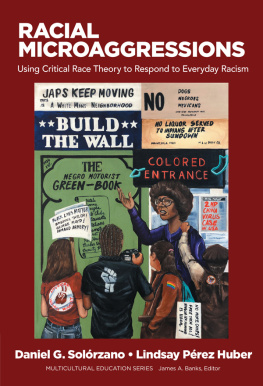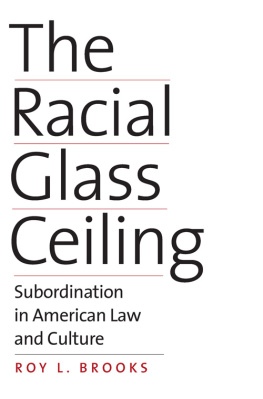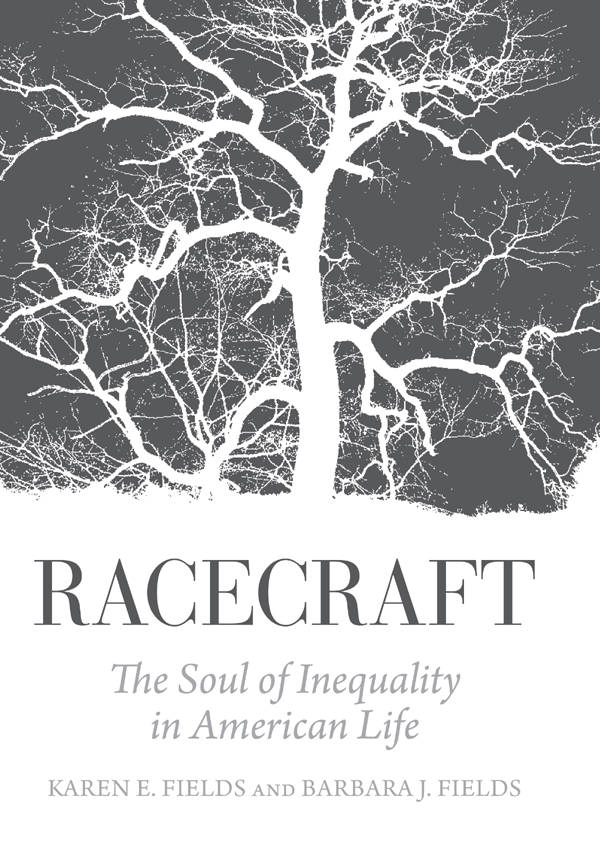
RACECRAFT
The Soul of Inequality in American Life
KAREN E. FIELDS AND
BARBARA J. FIELDS

Some readers may be puzzled to see the expression Afro-American used frequently in these pages, African-American being more common these days. We do not take a dogmatic view on such terminological questions, preferring the approach of our grandmother, who used all but two of the terms that prevailed in her day (she died in 1987, just short of ninety-nine): Colored, Negro, Afro-American, and black. She used the term nigger and its close South Carolina cognate nigra only when quoting others with disapproval. Although we leave our fellow citizens to their own choice, we prefer Afro-American . We prefer it because it is time-honored, having deep roots in the literary life of American English. Moreover, it leaves room for useful distinctions. Karens husband Moussa Bagate, a naturalized American citizen born in Ivory Coast, is an African-American. Barack Obama, the child of a Kenyan father and a Euro-American mother, is an African-American. Karen and I, like Michelle Obama, are Afro-Americans. Karens daughter Mamouna, the child of an African-American like the Obamas daughters, and an Afro-American, may choose whichever term she likes.
The Introduction, Chapters 1, 2, and the Conclusion are published here for the first time. Chapters 3 through 8 are republished with minor changes. Details of original publication are given in notes at the beginning of each chapter.
Contents
In the beginning was the deed.
Ludwig Wittgenstein quoting Goethe misquoting John the Apostle
The Idols of the Tribe have their foundation in human nature itself, and in the tribe or race of men.
Francis Bacon
Race is the witchcraft of our time.
M. F. Ashley Montagu
During the 2008 presidential election campaign, hardly a week passed without a reference to Americas post-racial society, which the election of Barack Obama supposedly would establish. If anyone really was imagining such a thing as a post-racial America, what that might be was hard to pin down. Right through the campaign, references to race and the race card kept jostling the post in post-racial. When insinuations about Obamas supposed foreignness cropped up, one journalist called that the new race card. How and why a handful of racist notions have gained permanent sustenance in American life is the subject of this book.
Other supposedly new notions are just as old and as deeply embedded. Todays talk of biracial or multiracial people rehabilitates mulatto , quadroon , octoroon , and the likeyesterdays terms for mixed ancestry. Whatever she thought she was saying about mixed ancestry and mental health, the very phrase accurate racial identity ought to set off sirens. Dangerous lies do not always dress the part.
Where but in recycled racist fiction are monoracial parents to be found to serve as guarantors of accurate racial identity? The least one can say is that the fiction misrepresents the American experience. According to an estimate derived from decades of census reports, some 24 percent of Americans listed in 1970 as white probably had African ancestors, while more than 80 percent of those listed as black had non-African ones, which implies that there were nearly twice as many white as black Americans of African descent. In sum, restoring notions of race mixture to center stage recommits us, willy-nilly, to the discredited idea of racial purity, the basic premise of bio-racism.
The latter, meanwhile, is neither gone nor forgotten. Bio-racism is a more precise appellation for the nineteenth-century research just sketched than the more usual term, race science. For all the measuring and experimenting that research inspired, it failed as science. Therefore, if the scientific logic is indeed non-racial, the folk classification ought to wither under its influence. To adhere to both old and new is to pick up and put down modern science with shameless promiscuity.
However, such picking up and putting down has its defenders, sometimes offering defenses so remarkable as to justify this books new coinage, racecraft. That term highlights the ability of pre- or non-scientific modes of thought to hijack the minds of the scientifically literate. Here, an anthropologist defends the traditional folk classification: After all, genetics has added very little to what scientists, or indeed any observant people, have known for centuries about human groups Modern genetics can be a bit more technically specific, but the basic truths are not new . The check-box method reduces genetics to a matter of querying, or simply glancing at, the research subject. If looks-like genetics and says-so genomics are respectable tools, what, indeed, could modern science add to popular belief?
Fortunately, not all American scientists choose to yoke their technological racehorse to the centuries-old oxcart. J. Craig Venter, whose imagination accelerated to warp speed the race to map the human genome, reflected on his work autobiographically in A Life Decoded .
Venters way of introducing new science to a lay public seems more in accord with the ingrained individualism that so impressed early visitors to America, like Alexis de Tocqueville in the 1830s, than with the ingrained anti-individualism that the very word gene evokes for many today.
Venter was surely mistaken, however, when he suggested that greater scientific literacy might help combat (altogether predictable) discrimination in the use of genomics.
But a statement does not acquire validity because a duly ordained scientist utters it. The sirens went off immediately. Certain of Watsons fellow molecular biologists took the floor with a scientifically correct formulation: It was not possible to draw such conclusions from the work that has been done on DNA. Dr. Venter, who happened to be traveling in the United Kingdom at the same time, said, There is no basis in scientific fact or in the human genetic code for the notion that skin colour will be predictive of intelligence.
Not all who piled onto Dr. Watson can claim to differ fundamentally from him. Shortly after he published his own genome online, scientists at Icelands deCode Genetics startled the world with a revelation. Watson had 16 times more genes of black origin than the average white European16 percent rather than the 1 percent that most of his origin would have. This level is what you would expect in someone who had a great-grandparent who was African.
As if all that were not enough, now comes a techno-fad that purports to determine the so-called tribal origins of Afro-Americans with the help of Personal Genetic Histories (PGHs). What an irony, then, if the World War II defeat of the Nazis did indeed discredit race science, only to have the yearning for identity and the jaw swabs of Afro-American bio-genealogists abet its revival. Whatever the post may mean in post-racial, it cannot mean that racism belongs to the past. Post-racial turns out to besimplyracial; which is to say, racist.
Something is afoot that is the business of every citizen who thought that the racist concepts of a century ago were goneand good riddance!as a result of the Civil Rights Movement. The continued vitality of those concepts stands as a reminder that, however important a historical watershed the election of an African-American president may be, Americas post-racial era has not been born. Perhaps it can be made if America lets those concepts go. But if they are hard to let go, why is that? What are they made of? How do they work? And what work do they do? Those are our subjects in the coming chapters. For now, we sketch our answers briefly and bluntly, so as not to preempt the essays to come. One general point must be made at the outset, however, and with an important caveat: Racist concepts do considerable work in political and economic life; but , if they were merely an appendage of politics and economics, without intimate roots in other phases of life, their persuasiveness would accordingly diminish.
Next page
